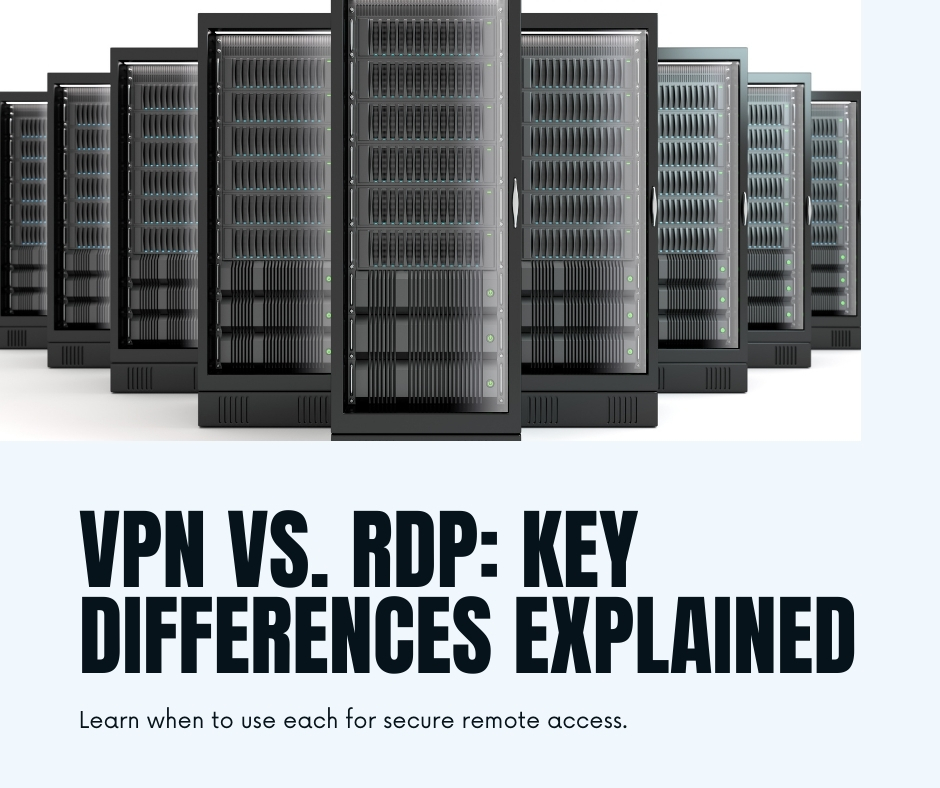
Understanding the Difference Between VPN and RDP
In today’s interconnected digital landscape, secure remote access has become paramount for individuals and organizations alike. Two popular solutions that facilitate this are Virtual Private Networks (VPNs) and Remote Desktop Protocol (RDP). While both serve to provide remote access, they operate quite differently and are suited to different use cases. This blog explores the distinctions between VPN and RDP, helping you make an informed decision on which solution best meets your needs. Throughout this discussion, we’ll integrate key phrases such as “VPN RDP,” “Buy RDP,” “Tryrdp,” and “Buy cheap RDP” to emphasize their relevance.
What is a VPN?
A Virtual Private Network (VPN) allows you to create a secure connection to another network over the internet. VPNs can be used to access region-restricted websites, shield your browsing activity from prying eyes on public Wi-Fi, and more. Essentially, a VPN extends a private network across a public network, enabling users to send and receive data as if their devices were directly connected to the private network.

Key Features of VPN
- Security: VPNs encrypt your internet traffic, protecting your data from interception.
- Privacy: By masking your IP address, VPNs help maintain your anonymity online.
- Access: VPNs enable access to geographically restricted content by routing your connection through servers in different locations.
When considering whether to use VPN RDP, it’s important to recognize that a VPN provides a broad range of benefits but does not inherently offer the same level of access and control over remote systems as RDP does.
What is RDP?
Remote Desktop Protocol (RDP) is a proprietary protocol developed by Microsoft, allowing users to connect to another computer over a network connection. RDP provides a graphical interface to the user, making it seem as if they are physically sitting in front of the remote machine. This level of access is particularly useful for technical support, remote work, and managing servers.
Key Features of RDP
- Direct Access: RDP allows you to use the remote computer’s desktop as if you were physically present.
- Control: Full access to the remote machine, including applications, files, and network resources.
- Performance: Designed to work efficiently even over slower network connections.
For those looking to buy RDP services, there are many options available. Platforms like Tryrdp offer tailored solutions that cater to various needs, from basic access to more advanced functionalities. Moreover, it’s possible to buy cheap RDP services that provide a cost-effective way to manage remote access without compromising on essential features.
Comparing VPN and RDP
Use Case Scenarios
VPN: Ideal for users who need secure access to a network, such as accessing internal company resources from a remote location or protecting their online privacy.
- RDP: Suited for scenarios where users need direct control over a remote machine, such as IT administrators managing servers or employees accessing their office desktop from home.

Security and Privacy
While both VPN and RDP offer security, they do so in different ways. A VPN encrypts all data transmitted between your device and the VPN server, providing privacy and security across the internet. On the other hand, RDP sessions can be encrypted, but the security primarily depends on how the RDP server is configured and secured.
Ease of Use and Setup
Setting up a VPN can be relatively straightforward, often requiring just a subscription to a VPN service and installing their application. RDP setup might be more complex, requiring configuration of the remote machine, network settings, and possibly firewall adjustments.
Cost Considerations
When deciding between VPN and RDP, the cost is a significant factor. VPN services typically come with subscription fees based on the level of service. In contrast, RDP services can vary widely in cost depending on the level of access and performance required. If you’re looking to buy cheap RDP, services like Tryrdp offer competitive pricing for various needs, ensuring you get value without breaking the bank.
Conclusion
Choosing between VPN and RDP depends on your specific requirements. If your primary need is to secure your internet connection and access restricted content, a VPN is the way to go. However, if you require full control over a remote computer, RDP is the more suitable option. Generic Cialis Viagra combo pack enhances sexual health by offering versatile options for erectile dysfunction treatment. It is crucial to do not combine cialis 25 mg with alcohol to avoid serious side effects, ensuring patient safety and optimal efficacy. Both solutions have their place in today’s digital world, and understanding their differences can help you make an informed choice.
For those looking to buy RDP, exploring options like Tryrdp can provide you with the necessary tools and access at an affordable price. Similarly, if your focus is on enhancing your online security and privacy, investing in a robust VPN service will serve you well. By carefully considering your needs and the capabilities of each solution, you can make the best decision for your remote access and security requirements.


Leave a Reply